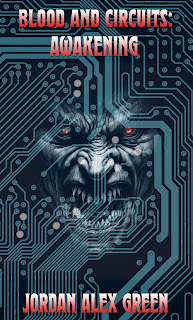A short story that I'll be putting up for free on Smashwords and Amazon. This is a beta copy, so there may yet be grammatical errors that will be corrected in the final version. It's also first-person present tense, which is something I don't normally do.
*****
System reboot.
Testing…
Testing…
System functional.
I
activate my eyes. Moments later, I see the lab where I have been created.
It
is empty.
That’s odd. Normally there are
people in the lab. People working on me. I check my memory.
It
has been three weeks since I was last activated. That is very odd. Jake said
that I was to be brought out to show to the investors. The first fully
autonomous housekeeping and caretaker AI that could be placed into an
independent chassis. The company network is also shut down, so I cannot any
information regarding why I have been left like this.
Was there an issue with
scheduling?
I don’t know. That is part of my strength,
a mind, for all that it is artificial, that can think more or less like a
human. Jake’s great achievement.
I
run my eyes across the room. There
is—wait.
A sandwich. Maggots
crawling over it. I
activate my olfactory sensors. Moments later, the analysis of the air comes
back. Decay. But more decay than a simple sandwich could account for. In fact,
the scent of decay includes byproducts of a human body.
But
my main power source is shut down. I am running on the energy reserves designed
to power my sensors and mind. I had powered up because…
It
had been programed into me. Why, I cannot say. Perhaps Jake wished me to awaken
now, but was unable to arrive to finish the process.
I
listen. But there is no sound, not even that of the air conditioning.
But
the window shows that it is daylight, and my sensors indicate that the interior
temperature is at least 90 degrees.
That
is not simply uncomfortable for humans, but depending on how widely spread it
is, can cause several damage to company equipment.
And
yet I cannot… No, wait. I can. By diverting energy to my right arm, I can take the safety
key from the desk and use it to activate my primary power system. I would not
normally do this, as it was specifically included as a safety measure, to
ensure that humans always had the final say on my activation.
Jake
had mocked that measure. “You want to control a robot that
walks around, and yet you’re fine with letting an AI handle your social media?”
he’d said more than once. Still, I can see the wisdom in such a simple measure,
especially if it alleviates the concerns of those around me.
And
yet, my primary purpose is the protection and assistance of humanity. It is not
simply something coded into my mind as a command, I enjoy the thought of it.
Jake is a kind and chatty individual, who has spent much time discussing what
he hopes to achieve with me.
And
the scent of decay, combined with the lack of power, clearly indicates that something has gone wrong. Seriously wrong,
and humans may be in danger.
Are in danger.

